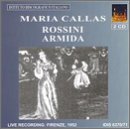| All Artists: Rossini, Callas, Albanese, Raimondi, Serafin Title: Armida Members Wishing: 0 Total Copies: 0 Label: Idi [Ital Disc Inst] Original Release Date: 1/1/1952 Re-Release Date: 4/16/2002 Album Type: Import, Live Genre: Classical Style: Opera & Classical Vocal Number of Discs: 2 SwapaCD Credits: 2 UPCs: 675754501525, 8021945000742 |
Search - Rossini, Callas, Albanese :: Armida
CD Details |
CD ReviewsScintillating performance by Callas at her absolute prime Vincent Lau | 04/24/2002 (5 out of 5 stars) "The date is 26 April 1952. Maria Callas is taking on the title role of Armida, her first and, as it turns out, last assumption in an opera seria by Rossini, at the Teatro Communale during the Florence Festival. The diva, who has begun to earn widespread recognition in Europe, is then at the peak of her powers as a virtuoso singer. Not only is she is absolute command of her powerful voice, which she uses to work wonders in almost every bar of her music throughout the evening, she also performs with great dramatic conviction. Awesomely imperious and meltingly tender at turns, she is the formidable sorceress who, let one not forget, is also a vulnerable woman hankering for love and understanding. Rossini wrote the role for the brilliant Spanish coloratura soprano Isabella Colbran during her prime, and the vocal line is sometimes so elaborate that it may even seem to be unsingable on paper. Yet, such is Callas's superior technique that not only is she able to toss off those intricate florid runs with apparent ease and abandon, adding in some musically effective embellishments of her own at times, her phrasing is always imaginative and the singing eminently stylish. This is surely one of the most vocally spectacular performances Callas has given in her entire career. Indeed, the audience that day has the pleasure and fortune to witness in the course of the performance some of the most astounding dramatic coloratura singing in the entire history of western opera.The most famous number in this rather obscured opera is the brilliant set of variations in Act II,¡§D'amor al dolce impero". Callas's performance here is even more assured (and much better accompanied) than the magnificent performance that she will be giving at a concert in San Remo 2 years later (now released¡§officially" by EMI). Such is her form that the diva here adds in a few more high Ds towards the end, which draws a whirlwind of applause from the audience. Yet, it is the final 12 minutes of the opera that best summarise Callas's artistry and greatness as a singer and interpreter. During her final confrontation with her lover Rinaldo, this Armida plunges head-on into a section of the most bravura of coloratura singing imaginable that has the enraptured audience bursting in applause prematurely. The subsequent swooning of the sorceress at the departure of his lover is delicately and movingly handled. Callas then fully conveys the contradictory feelings of sadness, frustration and anger when the character she plays is agonizing over love and revenge. And when the latter finally wins the day, the imposing voice of the avenging sorceress rides the orchestra in a most thrilling manner with the high notes cutting through the thick orchestral and choral textures like that of a mighty scythe. The 3 act opera is then brought to a rousing conclusion by a stupendous E flat in alt. It is vocally so exciting and dramatically so vivid! Can there be a more engrossing performance? Regrettably, Callas is never to perform the role again after this series of performance.At the time, the Rossini revival is still far off in the future and the 4 tenors - Albanese, Filippeschi, Ziliani and Raimondi ¡Vare not able to do full justice to Rossini's vocal lines, although they do sing with some passion and are able to throw in some secure high notes, which contribute to the excitement of the evening. (A peculiarity of this opera is that there are altogether 5 tenor roles, here shared by the 4 singers aforementioned.) Although some critics subsequently dismiss this performance as essentially a¡§one woman show", to be fair, the team of tenors do perform with some genuine vocal finesse at times. The orchestra, under the expert conducting of Tullio Serafin, gives the singers excellent support and, after a rather tentative overture, plays with gusto. The chorus brings forth masses of sound when required. The above is essentially what has been captured in this brand new 2 CD set released by IDIS. I have heard that the recording, which has appeared in various small Italian private labels over the years, is in poor sound. Yet, it seems that IDIS has re-mastered things in such a way that it is now in decent, or at least listenable, sound. Of course, allowances have to be made. The chorus is muddy and indistinct but the orchestra is clearly recorded (better than, say, those La Scala live recordings of the same period). The voices of solo singers are often enshrouded in a sort of reverberation as if they emanated from a bathroom nearby. Yet, the sound quality is already sufficiently good and consistent for one to appreciate this legendary performance given half a century ago.However, the presentation here is very economical. Besides a short Italian article (with English translation), neither libretto nor even a synopsis has been offered. There are also no photos in the flimsy booklet. Coupled with the fact that there are lots of cuts in the music, which was rather usual in those days (there is still more than 2 hours of playing time), this set cannot be recommended to those who wish to familiarize themselves with Rossini's opera. Yet, it is evident that the value of this recording lies elsewhere. Indeed, it is the historical value of this set, as well as Callas¡¦s scintillating performance and the improved sound quality, that won my 5-star rating."
|

